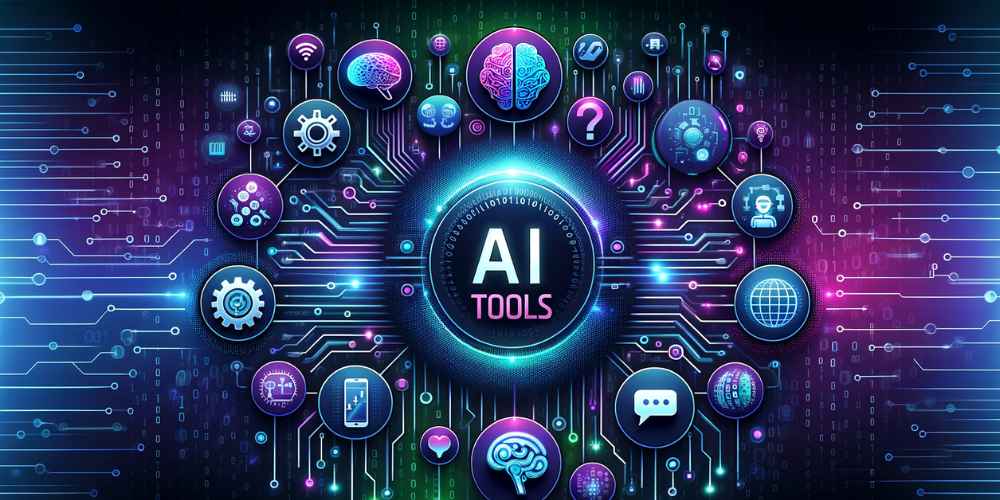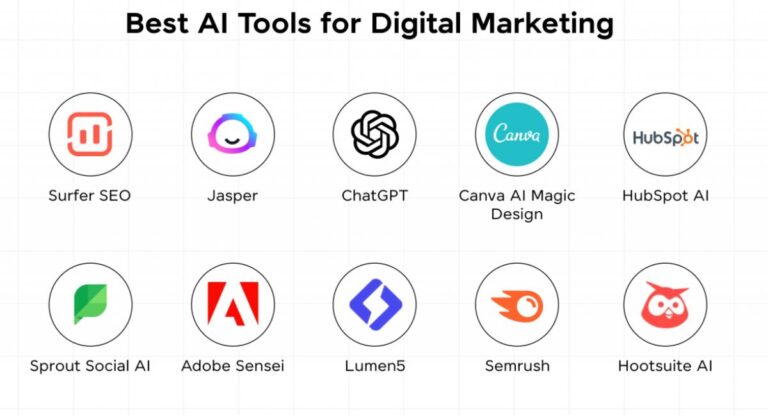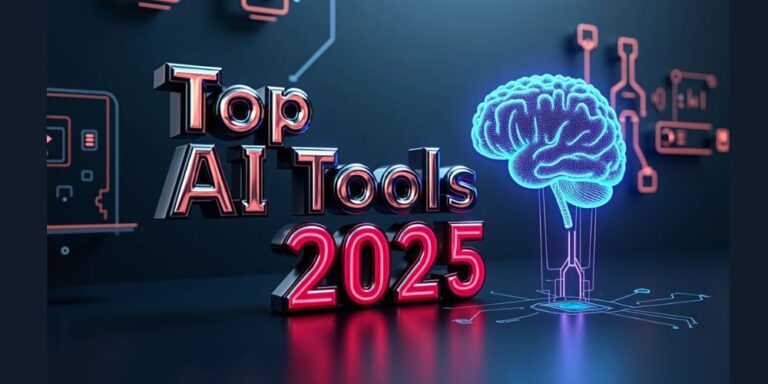In 2025, AI and AI Tools is no longer just for big tech companies. Mid-sized businesses are using it to work smarter and grow faster. From automating marketing to improving customer service and streamlining operations, AI tools are becoming more affordable and easier to use.
Many businesses are now turning to marketing automation tools and AI-powered platforms to stay competitive and make data-driven decisions. This blog explores how AI is transforming mid-sized companies, the top tools making an impact, and how you can start your own AI journey.
Also Read : How to Choose the Best AI Software in 2025 for Your Business Needs
The Rise of AI Tools Adoption in Mid-Sized Businesses
AI is no longer something only large enterprises experiment with; mid-sized businesses are embracing it faster than ever. In 2025, AI adoption has gone mainstream thanks to more affordable tools, easier integration, and growing pressure to innovate. Businesses that once hesitated are now realizing that staying competitive means making AI part of everyday operations.
Why 2025 Is a Pivotal Year for AI Tools
AI has officially crossed the threshold from emerging trend to everyday business tool. For mid-sized companies, 2025 marks a turning point where AI is no longer viewed as optional; it’s now critical to staying competitive.
Here’s why this year matters:
- AI is now a necessity, not a luxury
Businesses are expected to respond faster, operate smarter, and deliver more personalized experiences, and AI makes that possible. - Implementation is more affordable than ever
Tools are no longer limited to enterprise-level budgets. Many AI platforms now offer flexible pricing and easy onboarding. - Customer expectations are driving urgency
Personalization, 24/7 support, and data-driven services have become the norm, pushing mid-sized firms to adopt AI to keep up.
A survey highlights that 98% of SMBs use AI software, with 40% relying on generative AI. MSI’s AI-ready desktop hardware is playing a crucial role ( Source: Business Insider )
Benefits of AI Tools for Mid-Sized Companies
AI isn’t just about automation; it’s about giving mid-sized businesses the edge to grow smarter and faster. In 2025, companies are tapping into AI not just to reduce manual work but to improve how they make decisions, serve customers, and manage operations.
Key benefits mid-sized businesses are seeing:
- Time-saving through automation
- Routine tasks like scheduling, data entry, and reporting are now handled by AI
- Teams can focus more on strategy and growth
- Better decision-making with real-time insights
- AI tools analyze large volumes of data faster than any human
- Leaders get instant, actionable insights without waiting for reports
- Personalized customer experiences
- AI helps tailor content, offers, and interactions to each customer
- Improves engagement, loyalty, and satisfaction
- Cost efficiency at scale
- Fewer manual errors, more optimized workflows
- Reduces overhead without compromising performance
- Smarter marketing outcomes
- AI-driven tools improve campaign targeting and timing
- Higher ROI on ads, emails, and content
Also Read: Top 7 AI Tools Every Entrepreneur Should Use in 2025
Key AI Tools for Business in 2025
AI tools have become more intuitive, affordable, and business-ready. Mid-sized companies now have access to platforms that simplify everything from content creation to analytics without needing a full tech team. Choosing the right tools can be a game changer for both productivity and growth.
Top AI tools making an impact in 2025:
| Tool | What It Does | Best Use Case |
| Jasper AI | Writes content like blogs, ads, emails | Content marketing, copywriting |
| ChatGPT Enterprise | Automates support and internal workflows | Customer service, FAQs, sales support |
| Tableau AI | Visualizes and analyzes business data | Marketing insights, trend reports |
| Fireflies AI | Transcribes and summarizes meetings | Team collaboration, documentation |
| Notion AI | Assists with task management + note creation | Project planning, internal knowledge |
Why these AI tools matter:
- Easy to integrate with existing systems
- No coding required for most platforms
- Scalable as the business grows
- Helps bridge the resource gap in mid-sized teams
Top Marketing Automation AI Tools for 2025
Marketing automation has become a must-have for mid-sized businesses looking to scale without growing headcount. The latest AI-driven tools can handle everything from email campaigns to customer segmentation, saving time and improving results.
Best marketing automation tools used by mid-sized companies:
| Tool | Key Features | Ideal For |
| HubSpot AI Suite | Predictive lead scoring, smart email sequences | B2B marketing, sales alignment |
| Mailchimp AI | Automated campaigns, A/B testing, segmentation | Email and e-commerce campaigns |
| Zapier AI | Connects apps, automates workflows across platforms | Cross-functional automation |
| ActiveCampaign | AI-powered CRM, behavioral email tracking | Lead nurturing, lifecycle marketing |
| Copy.ai | Writes email copy, ad headlines, social captions | Ad creatives, email content |
Why these AI tools work well for mid-sized businesses:
- Reduce manual effort in campaign setup and follow-up
- Improve targeting and personalization automatically
- Easy integration with CRMs, landing pages, and analytics
- Help small teams achieve big marketing goals
AI Tools Integration Across Business Functions
AI isn’t limited to one department. In 2025, mid-sized companies are embedding AI into multiple areas, from operations to customer experience. The goal isn’t to replace teams but to make them more effective with better data, automation, and speed.
Where mid-sized businesses are using AI Tools today:
- Marketing
- Content recommendations and A/B testing
- Automated ad placement and optimization
- Real-time audience segmentation
- Customer Support
- AI chatbots for 24/7 query handling
- Automated ticket classification and routing
- Sentiment analysis for faster resolution
- Human Resources
- Resume screening and candidate ranking
- Employee engagement analysis
- Predictive retention tools
- Finance & Operations
- Expense reporting automation
- Fraud detection and anomaly alerts
- Inventory and logistics forecasting
Why it matters:
AI frees up human teams to focus on creative, strategic work while reducing errors and speeding up decisions across the board.
Also Caption: How to Build a Personal Brand That Attracts Startup Investors
Challenges Faced by Mid-Sized Firms in AI Tools Adoption
While AI offers big benefits, the path to adoption isn’t always smooth. Many mid-sized businesses face practical hurdles, from limited budgets to integration issues. Understanding these challenges early can help avoid delays and failed implementations.
Top challenges mid-sized businesses are facing:
| Challenge | Details |
| 1. Budget Constraints | Upfront costs for tools, training, or integration can feel overwhelming |
| 2. Skill Gaps | Internal teams may lack AI knowledge or experience |
| 3. Integration Issues | Legacy systems often don’t “talk” easily with modern AI platforms |
| 4. Change Resistance | Employees may resist automation due to job security concerns |
| 5. Measuring ROI | Many firms struggle to define success metrics for AI implementations |
What businesses can do:
- Start with small, measurable use cases
- Use AI tools with low learning curves
- Invest in basic training before scaling
- Involve teams early to build buy-in
Steps to Start Your AI Journey
Getting started with AI doesn’t require a massive overhaul. For mid-sized businesses, the key is to begin with focused, low-risk applications that solve real problems and then expand based on results. Here’s a simple path to follow in 2025.
6-Step AI Roadmap for Mid-Sized Businesses:
- Identify Operational Gaps: Look for time-consuming, repetitive tasks and prioritize areas with clear ROI potential
- Choose the Right Use Case: Start with marketing automation, customer service, or analytics and pick a tool that solves one core pain point
- Select Easy-to-Use AI Tools: Go for platforms that don’t require deep technical expertise and make sure they integrate well with your current systems
- Train Your Team: Offer basic training or workshops and create internal champions to support adoption
- Measure Early Results: Set clear KPIs (e.g., time saved, leads generated, error reduction) and track performance to justify scaling
Pro Tip: Don’t wait for perfection. Start small, stay flexible, and focus on solving real problems with real data.
Case Studies: Real Mid-Sized Brands Leveraging AI
Many mid-sized companies are already seeing real results from AI without huge budgets or massive teams. These examples show how smart implementation of the right tools can lead to meaningful improvements in performance and efficiency.
- Retail Company Smarter Inventory Planning
- Used AI to forecast demand across seasons
- Reduced stockouts by 28% and improved order accuracy
- Saved hours of manual inventory tracking
- Tech Services Firm Faster Customer Support
- Integrated AI chatbots into their help desk
- Cut first-response time by 40%
- Increased customer satisfaction without adding staff
- Education Platform: Personalized Marketing at Scale
- Deployed marketing automation tools for lead nurturing
- Increased email open rates by 35%
- Generated more conversions with less manual effort
- Financial Consultancy: Smarter Lead Scoring
- Used AI to qualify leads based on behavior and engagement
- Boosted conversion rate by 22%
- The sales team focused only on high-quality prospects
Takeaway:
Even small-scale AI adoption can deliver measurable results. The key is to start with a clear objective, track performance, and build from there.
Conclusion
AI is no longer out of reach for mid-sized businesses; it’s quickly becoming a core part of how they grow, compete, and operate smarter. With the right tools and a focused approach, even companies with limited resources can harness AI to improve marketing, decision-making, and customer service.
You don’t need to adopt everything at once. Start small, measure results, and scale what works. The real transformation happens when AI is used not just as a tool but as a strategic partner in your business.
Get Insider Business & Startup Growth Insights Straight to Your Inbox!
Subscribe now and stay ahead with actionable tips, founder stories, and investor-ready branding secrets.
Frequently Asked Questions (FAQs)
- What are the best AI tools for mid-sized businesses in 2025?
Jasper AI, ChatGPT Enterprise, Notion AI, Fireflies AI, and Tableau AI are top picks for content, productivity, and analytics. - How can marketing automation tools benefit my business?
They save time, improve targeting, and help you run smarter campaigns with better ROI. - What does AI adoption in business really mean?
It means using AI technologies to enhance or automate business operations, from marketing to customer support. - Is AI too expensive for mid-sized companies?
Not anymore. Many tools offer flexible pricing plans, and the ROI often outweighs the initial cost. - Where should I start with AI in my business?
Begin with a specific use case like customer support or marketing and expand gradually as you see results. - Can AI integrate with our existing tools?
Most modern AI tools are designed to plug into CRMs, email platforms, and other business systems easily. - What are common mistakes to avoid in AI adoption?
Jumping in without clear goals, ignoring team training, or expecting instant results. - Will AI replace human employees?
AI supports people; it handles repetitive tasks so teams can focus on strategy and creativity. - How do I measure the ROI of AI tools?
Track key metrics like time saved, cost reduction, lead quality, or customer engagement. - Is AI necessary for business growth in 2025?
Yes. To stay competitive and meet rising customer expectations, AI is becoming a must-have, not just a nice-to-have.











